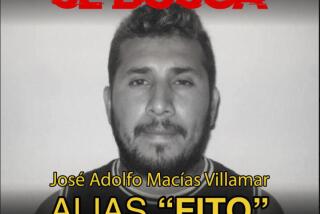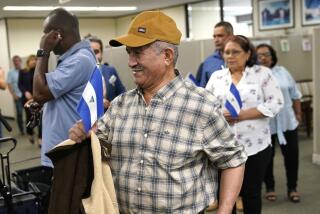Communist Party Founder Awaits Release in Manila
- Share via
MANILA — The founder of the Communist Party here, Jose Maria Sison, jailed by the Philippine military for more than eight years, said Saturday that his bags are packed but that he has no word yet that he will be freed under the new government’s political prisoner release program.
Sison, 47, said that he had expected to leave the Ft. Bonifacio detention compound in Manila either today or Monday. But Rene Saguisag, a spokesman for President Corazon Aquino, said that his fate and that of three others would not be decided until Wednesday, when a committee on prisoner releases meets again.
“I have been here for eight years,” Sison told reporters. “I can wait a few more days.”
Saguisag said last week that Aquino was meeting “very strong resistance” from military officers over the possible release of Sison and Bernabe Buscayno, a guerrilla leader, despite her pledge that there would be “no exceptions.”
Meanwhile, members of several legal organizations of the political left met Saturday to map strategies designed to exploit the new climate of freedom in the Philippines and place themselves in position to seek power should Aquino falter.
“During a revolution, the first new government is always a moderate one,” Roger Birosel, a member of the Nationalist Alliance for Justice, Freedom and Democracy, told a group of about 70 supporters gathered in the Manila suburb of Quezon City to discuss the changed political situation.
Leaders of several left-wing organizations indicated that they will press for Aquino to dismantle authoritarian legal structures set up under former President Ferdinand E. Marcos and to reduce the power of the armed forces.
“I think now we’ll have more elbow room to organize in the countryside,” said Jaime Tadeo of the Peasant Movement of the Philippines.
As the release of Sison was being discussed by political and military officials, the armed forces revised upward the number of political detainees it says it holds to 441. Task Force Detainees, a private monitoring group, said that more than 600 are being held. The official count and that of the monitoring group have been at odds since Aquino announced the dramatic plan, her first reform measure.
More than 30 prisoners have been released so far, including Horacio Morales, a former government official, who was freed Saturday. Morales said that he had been tortured with lighted cigarettes during his four years of detention.
Sison, wearing a Hawaiian shirt, shorts and rubber sandals, said that he had not been abused while in custody.
Asked what he would do for the Communist Party, which has more than 15,000 guerrillas in its New People’s Army in the hills here, he said: “I may have some moral influence, but I don’t have the authority to command.”
Since Sison has been in jail, underground party leadership has passed to Rodolfo Salas. Sison said that he did not know whether he would be able to make contact with the underground leadership.
He declared that “all progressive people are happy” with Aquino’s victory. Saying that the party line opposes fascism, imperialism and feudalism, he added that “as far as the anti-fascist line is concerned, there is satisfaction.”
Aquino has said she would welcome any Communists who renounce violence, but Sison said, “I’m not going to sign anything that simplistically says I’m going to renounce violence if it suggests I’ve been using violence unjustly (in the past).”
“The new government is quite open,” he said, warning that, in his opinion, it’s not “eliminating the potential of Marcos or some members of the family” to stage a comeback.
Sison seemed fully current on affairs in the Philippines, and said he had spent his time reading, writing and jogging in the small compound where he is detained.
Several leaders of legal leftist organizations suggested in interviews Saturday that, with Marcos gone, they plan to direct much of their fire at what they anticipate will be the close ties between the Aquino government and the United States.
“Unfortunately, I think this government is going to depend heavily on U.S. support and they might sacrifice our own internal development,” said Leandro L. Alejandro, secretary general of Bayan, an umbrella leftist organization.
Some political analysts here believe that the left greatly weakened its political position by its failure to support Aquino during the campaign for the special Feb. 7 presidential election.
“Groups like Bayan have just been too late,” one Western diplomat said. “They showed that they are an elitist group that did not really believe in the idea of people’s power.”
Indeed, some officials of left-wing groups now confess that they were taken by surprise by the rapid turn of events leading to Marcos’s flight into exile.
“The left, as usual, has been left out,” Birosel, a former UC Berkeley student, told the meeting of the Nationalist Alliance for Justice, Freedom and Democracy. “Nobody was prepared. We were all confused and disorganized and we didn’t know what to do.”
One left-wing strategy will be to argue that Aquino represents only the Philippine middle class.
“This is not a revolution of the peasants and workers,” said Tadeo, of the Peasant Movement of the Philippines.
Another approach will be to press the new government to grant new economic benefits to various constituencies.
Nick Elman, secretary for mass campaigns of the May 1 Movement, a worker’s group, said that Aquino will be asked to repeal existing laws restricting the right to strike and that the left will seek a price freeze and salary increases.
For the moment, many left-wing groups are unsure exactly what approach to take toward Aquino.
“Do we denounce this government?” Darwin Flores, regional liaison officer for the Nationalist Alliance, asked. “Do we recognize this government? Do we ignore this government? Or what?”
More to Read
Sign up for Essential California
The most important California stories and recommendations in your inbox every morning.
You may occasionally receive promotional content from the Los Angeles Times.













